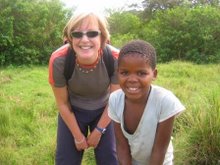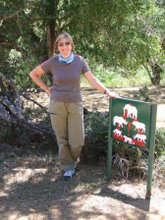The main northern loop road takes around three days from Axum to Lalibela by bus. We saw on our map that there was a shortcut road, that ought to take a day less to travel. The only thing was that transport links were less certain as it was much less used, sparsely populated and the road wasn't sealed which could be a problem in the rainy season. Still, the scenery was meant to be superb, and we were confident we'd be able to sort something out. We had got the car to drop us at the head of this road, the town of Adwa, on the way back from Debre Damo.
We were up at the usual 5am or so, and quickly to the bus station next door to the Tefari Hotel. There was a minibus to Abi Aday 90km away, but it took so long to get going we had time to go back to the Tefari for coffee. We were in the small and rather miserable looking town of Abi Aday in time for lunch. The Debre Selam Pension seemed nice, and for 30 bir felt like a bargain. We strolled around the town a little bit, half looking for a place to eat and eventually saw a sign saying merely "restaurant". The menu was all in Amharic, so not much use, and the waiter/cook spoke no English. In the end I ventured into the kitchen, saw one of the braziers used for serving yummy grilled meat and pointed at it. Done! Soon a brazier full of grilled meat, topped with chilli, onion, tomato, peppers and hard boiled egg arrived and I had even successfully negotiated bread instead of injera.
There didn't seem to be any other faranji in town, meaning we had the entire population of children all to ourselves. Super! Time for a break in a small cafe near the pension, no children allowed. We saw a tele shop over the road and asked about internet access. "Sure," said the manager, "I'll take you to my office where I have 13 networked computers and a leased line." Really? It seemed incredible, but he was insistent. We raced back to our room to pick up our notes, and while we were there noticed that a bag had been opened, our phone and sunglasses stolen. Not a nice feeling. We went downstairs and spoke to the hotel boy who'd shown us to our room and told him and the manager what had happened. He seemed the obvious suspect, and the manager insisted that he accompany us to the police station. Luckily one of the policemen spoke some English, but the language problem didn't stop all three getting out their bits of paper and making notes. Two policemen came back to the room with us, and we re-enacted the scene and checked our packs in front of them. They interrogated the boy about keys, but really there was nothing else much they could do. They left with our contact details, and we heard as we left the next morning that they had arrested the boy. But there was no sign of our belongings.
We finished the day drinking beer, eating key wat (a sort of fiery stew) and watching an old 80s spy spoof on satellite TV, once the power came back on.
The next section of the journey to Lalibela is, according to our guide book, a bus ride to Sekota. Yeah right! The bus boys were all shouting "Yechillay" and "Tembien" - they looked a bit blank when we asked for Sekota and muttered something about contract, but put us on the Yechillay bus. We shrugged, and went along with it. I checked out Yechillay on our map, and it was reassuringly in the right direction. Maybe it will be more than one hop we conjectured. We nipped across the road for breakfast while they mucked around filling the bus, and somewhat amazingly watched an old episode of Colombo, starring Johnny Cash as the baddie. It made the time go, and about 8.30 off we set. Yechillay is a small farming outpost, in the middle of what was the famine area in the mid-1980s. Not the kind of place you want to be stranded. But stranded we were about to be. The meaning of "contract" became clear. If we wanted to go onto Sekota we would have to pay. Eventually we agreed on the sum of 500 bir for the next 70km leg - this didn't compare well with the 12 bir we had just paid to come 35km! The driver arranged for a couple of "supporters" to accompany us because the road is "very desert". Since we were paying such a premium for the ride, I pulled rank and sat in the front. It was a fantastic drive and I figured I may as well enjoy it. The mountain roads were spectacular and we wound down into deep river valleys, and then up the steep sides to cross saddles into yet another valley, over and over again. There were very few people, which was a bit of a shame as we had agreed that we would keep the fares of anyone we picked up. We saw a large fox-like animal, and almost ran over a tortoise. I was feeling relaxed and happy, until I noticed a flash of red in Max's hand. He had got his Swiss Army knife out, and then I realised that we were in a van with a driver we neither liked nor trusted, the bus boy, and two locals recruited by the driver, going through empty country. Hmm, potentially an interesting situation. But as we approached Sekota we saw people looking for a ride, and soon the van was full again. I couldn't see the financial transactions from my seat, but somehow I doubted that our costs would be greatly offset.
We got into Sekota round 1pm, and pulled into the filling station. The Caltex guys were keen to help us on our way to Lalibela, and said they'd ask for rides for us. Max spotted a couple of 4WDs in town, and went to track down the drivers. They were eating lunch, so we decided to join them. It turned out to be market day in Sekota, which made us feel confident about getting a ride through to Lalibela. We met an Italian guy working for an NGO, and his Ethiopian colleagues sent a boy off to enquire about rides. We ate pasta, learned that the Orthodox church had just entered a two week fasting period - no meat, eggs or dairy products for the devout.
It seemed that there was a ride going through - we hopped in and spoke to the driver. He wanted to charge us 400 bir to take us 42km to a nothing town where we would stay with his family. The next morning we might go to Lalibela, or we might not. We really didn't like the sound of this, and let it go. Somewhat dispirited we wandered down to the COOPI office (the Italian NGO) to see what they were doing. Food security was their mission - helping local authorities with agricultural practices, water supply and gender equality. Good stuff. But chatting with them we also realised what a fix we were in. Frederico said he'd paid 1000 bir to get to Lalibela - it's the going rate he said. Crikey. We arranged to meet them all for dinner at 6, if we were still in town, and headed back to the filling station to see what they'd found out. It seemed that we could get to Lalibela tonight, for 1000 bir. We took it. It was lots more expensive than we'd ever imagined, but it was hard to see what else to do. The driver was rustled up, the car filled with gas, we paid the deposit and various tips to our local "assistants", and set off on the 130km journey about 4.30. Our packs were slung in the back of the 4WD ute, protected from the elements by a hessian sack. More incredible mountain scenery - it really has to be the world's best kept secret - and then, predictably rain. The road was pretty dodgy in parts, but then it got dark and I couldn't really see it. Then it started to rain so hard we had to stop to let it pass. It was bad enough for us, but I felt really sorry for the people I saw huddled under umbrellas on the side of the road, or walking miserably with their stock. The lightning was amazing, and really lit up the mountainside for us. The driver was grim faced and silent. So were we. The drive took over 3 1/2 hours and we arrived in Lalibela in the pitch black and pouring rain. Our packs were drenched, but the Aleif Paradise hotel was nice - satin bedspreads and all. By the time we trudged round the road for dinner we felt like we had had a day and a half. Luckily we still had enough money to pay for dinner, but the bank will be on tomorrow's agenda, along with the wonders we have travelled so far to see.
Thursday, 9 August 2007
Subscribe to:
Post Comments (Atom)




No comments:
Post a Comment